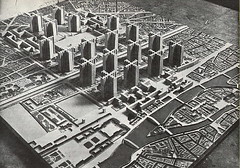Back at the beginning of this blog, Doctor June McCarrol was featured as the Inventor of Highway Pavement Markings! You can read her remarkable story Here. Her genuine concern led her to activism as she petitioned the Indio government and later the State of California. Alaska Governor Palin is made of the same stuff. Beginning as a concerned parent she got involved in local government. In 1992 she ran for city council of Wasilla, AK and served there until 1996 when she became mayor. She was appointed to the Alaska Oil and Gas Conservation Commission and served as Ethics Commissioner from 2003 to 2004. She resigned and exposed corruption in the commission, fingering prominent members of her own party. Her credentials as a reformer clearly established, Ms. Palin ran for Governor in 2006 and defeated incumbent Republican Governor Murkowski in the primary. She went on to win the general election and became, at 42, Alaska's youngest Governor in history.
As Governor, Palin is known as a foe of wasteful spending and is famous for her vetoes of questionable expenditures. She has another unique qualification for leadership -- she is the Mother of five children! Her youngest child, Trig, was born while she was Governor of Alaska. That has to be another historic first! Her oldest son serves in the U.S. Army and will serve in Iraq starting this fall.
So how did she get the nickname "Barracuda?" It goes back to her Wasilla High School basketball days when she earned the moniker: "Sarah Barracuda" for her fierce play as point guard. Off the court, she was President of the school's Fellowship of Christian Athletes Chapter. Do you see a penchant for leadership here?

Alaska Governor Sarah Palin in Kuwait.
Binyamin L. Jolkovsky of Jewish World Review ran This Piece by Nat Hentoff in May! Mr. Hentoff is a liberal thinker who is pro-life [he thinks for himself, obviously]. His observations about Ms. Palin and her qualifications for the job are well worth reading, even now, months after Hentoff wrote them. This is no overnight decision.
A Vice President We Can Relate to
Sarah Palin represents a rebirth of that Jeffersonian ideal where people from ordinary life go up to Washington to represent us and then come home! She's no Washington insider in a grey suit.
She got involved in the first place because she cares. I thought of a young mother of five we know who is very active in her kids' schools, and said to my wife "that's like (our friend) being chosen to be Vice-president." Ms. Palin should take that as a great compliment. She's truely one of us!













